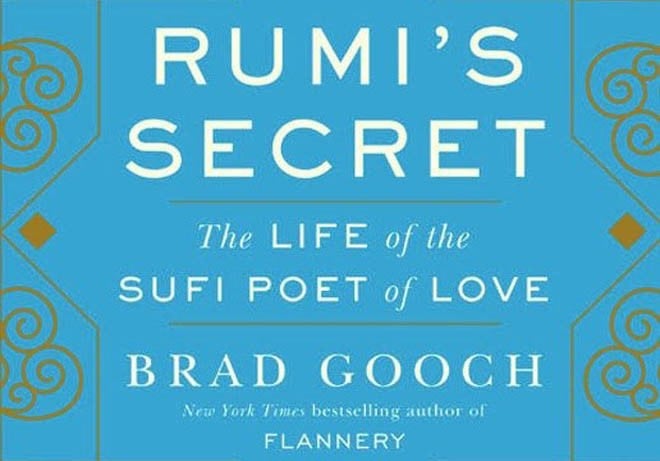
Rumi, the poet, who is seen both as a mysterious figure and a nonconformist opposed to the traditional and orthodox Islamic narrative

Sitting on a book shelf, Rumi’s Secret instantly grabs your attention. A curious reader would want to peruse the juicy details of the life of, arguably, the most beloved poet of love. There are none here, for Brad Gooch’s book is predominantly an exploration of Jalaludin Rumi’s public personae vis a vis his peers, close friends and family members. He took a geographical approach -- travelling along Rumi’s footsteps for six years -- to locate the man beyond the poet.
Given the Western fixation with Rumi, the poet is seen both as a mysterious figure and as a nonconformist opposed to the traditional and orthodox Islamic narrative. Most of his life is cloaked in mystery and the times he lived in were marred by political turmoil.
Rumi himself, as we now know, wasn’t much of a narcissist. He, however, still remains a darling of both intellectual and historical researchers. Despite the extensive scholarship, two aspects of Rumi’s life remain appealing, his uncommon view of God as a beloved and, more importantly, his relationship with Shams of Tabriz.
Rumi’s Secret takes a personal approach to the poet’s life. He was not a hermit enclosed in the indoors practising sama and writing poetry. Unlike the number of studies on Rumi that focus mainly on his work, Gooch’s is a reminder of the Sufi master’s worldliness. Rumi was very much the son of his father, married twice and had a family of his own. The writer tracks the real man through the journals of Baha Valad, Rumi’s father, and Sultan Valad, Rumi’s son, among other pupils and companions.
In Konya, where he worked and lived most of his adult life, Rumi had his own set of issues both at home and outside. His works are clearly intertwined with the people and places in his life. The foremost being his father.
Baha Valad’s diaries give a glimpse into Rumi the precocious child, a five-year-old agitated Jalaludin saw angels and had to be calmed at seeing these visions. The boy "looked to his father with the admiring and idealizing eyes". The admiration was mutual, as the father saw in his young son not only the possibility of a theological intelligence like his own but a lot more. His decision to travel -- stemmed in his desire for self-actualisation and escape from the limitations of his small hometown -- proved healthy for Rumi as a young boy who would ultimately become a teacher like his father. Later, Rumi would also take inspiration from his father’s notes for his masterpiece Masnavi.
Rather than tiresome details about Rumi’s adolescence, the books delves into the growth of early Sufism and some of the controversial Sufi sects and practices. ‘Shahed-bazi’ for instance was a practice espoused by Al-Ghazali’s brother Ahmad (unsurprisingly, a favourite of Rumi) "meditating on the eternal while gazing on the face of a beautiful boy". There’s also the mention of ‘drunken dervishes’ who would openly drink wine (the heretical Hallaj was a part of this sect) or the ‘malalatiyya’ dervish who would camouflage their piety by feigning sinfulness or madness. These schools and their practices would influence Rumi in multiple ways and he would even acknowledge their influence later in his life.
Enter Tabriz.
‘The face of the sun is Shams of Tabriz.’
What started as a meeting in the middle of the marketplace ended with Rumi’s last breath. Shams of Tabriz was the single most powerful force behind the genius of Rumi and there’s little to argue otherwise. Their encounter begins when Shams sees Rumi with his pupils in the street, raising the issue of Iranian Sufi mystic Bayazid Bastami. It is said that after this conversation Shams "fell in a swoon". They became inseparable.
There is no evidence of the often speculated nature of their relationship. In a way Shams could be Rumi’s alter ego. Against the composure and propriety of Rumi, you had the eccentricities of Shams who would later charge a fee for an audience with his friend. While Rumi was a beloved venerated tutor, Shams’ heretical and rude gestures would invite the irk of the locals.
Rumi’s ‘post-Shams’ life can be divided into Shams’ first meeting and his two disappearances from Rumi’s life, the second being final and equally heartbreaking for Rumi. His son would later record, "The Sheikh was crazed by the separation." A separation that would epitomise the ultimate human sorrow in Rumi’s poetry.
"The most guarded secret in Rumi’s life", concludes Gooch, "concerned the nature of his fiery and transformative relationship with Shams of Tabriz". To us, the modern readers, the idea of a passionate yet platonic relationship is alien as we accustom ourselves to concrete definitions and labels.
‘I will never rest, until my
soul flies
To the towering soul
of Shams of Tabriz’